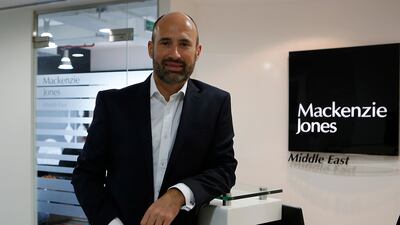A trial in Iceland to introduce a four-day working week has resulted in a boost in productivity and a fall in stress levels.
The world’s second-happiest nation, according to surveys, conducted a series of experiments over a four-year period involving 2,500 people – around one per cent of the population.
Many of the people who took part in the public sector trial went from a 40-hour working week to a 35 or 36-hour week.
Mackenzie Jones
The National spoke to some of the UAE’s leading employment experts to see if this most Scandinavian of models could be imported to the Gulf region.
Their answers made disappointing reading for those hoping to get an extra day off work to soak up the sun.
“I can’t see it working as it doesn’t make sense for companies here,” said David Mackenzie, group managing director at recruiters Mackenzie Jones.
“There has always been a culture of hard work and putting in reasonably long hours in the UAE.
“I can’t say that changing unless the public sector introduces it first, with the private sector following its lead.”

The Iceland trials, run by Reykjavik City Council, saw a host of workplaces taking part –including schools, hospitals, social service providers and offices.
The trials were so successful that many have adopted the four-day week as a permanent model.
Now the vast majority of Iceland’s workforce – 86 per cent – has been able to move to a 35 to 36-hour week without taking a pay cut.
Mr Mackenzie said that would not be the case with companies in the UAE.
“The first thing employers will do is say you are only working four days a week now so we are reducing your salary by a day,” he said.
“Employers will not pay people more for doing less.”
He said the economies in Iceland and the UAE were completely different and what worked for Iceland would not necessarily work in other markets.
“I can’t see the UAE being able to move to a four-day working week, because of the type of people who work here and the type of people who run companies here,” he said.
“The UAE has a 50-year-old economy while Iceland’s is more than 400 years old; you are not comparing like for like.”
He said the first hurdle to the adoption of a four-day working week in the UAE was an obvious one – people come to the region to work.

Around 50 per cent of the Gulf’s population are foreign workers. In the UAE and Qatar, that figure is even higher, at 85 per cent.
“If somebody said would you take a day’s less money but you get an extra day on the beach, would you take it?” he said.
“Some of the younger people might, but most people who are here to focus on their career and provide for their families would want to carry on working five days a week.
“The people who come here just for the lifestyle don’t tend to stay that long anyway.”
The pandemic was another factor that worked against the adoption of a four-day working week, according to Mr Mackenzie.
“It doesn’t seem logical when you consider we are coming out of such a difficult time with a huge amount of people out there who have been made redundant,” he said.
“People are more likely to be interested in working an extra day for more pay right now.”
The results of the study in Iceland were published as a study by UK-based think tank Autonomy and the research organisation Association for Sustainability and Democracy (Alda) in Iceland.
“The Icelandic shorter working journey tells us that not only is it possible to work less in modern times, but that progressive change is possible too,” said Gudmundur Haraldsson, a researcher at Alda.
Iceland is not the only country in the world to explore a four-day working week though.
Earlier this year, the Spanish government announced it would be testing out the concept of a 32-hour working week, while New Zealand Prime Minister Jacinda Ardern said employers should consider a four-day week to help employees obtain a healthy work/life balance.
The consumer goods firm Unilever announced in November last year it was introducing a four-day working week in New Zealand that would run until December of this year, with staff not having to take a salary reduction.
Another Dubai recruiter, Ian Jenkins, said the more successful firms would not simply be focusing on for how long somebody was working.
“The focus should be on output rather than attendance,” he said.
He also said it was unlikely the UAE could adopt a four-day working week without employees having to take a hit on their wages.
“The UAE is a service-led economy. Assuming there was no change in salaries, this would mean going to a four-day week would raise costs for service providers,” he said.
He also questioned whether the model was practical, with so many still working remotely due to the pandemic.
“The lines between work and home were blurring increasingly with employees expected to be always on regardless of working hours, this was driven by smartphones and digital working practices pre-pandemic,” he said.
“Remote working during the pandemic has increased this pressure,” said Mr Jenkins.
“A four-day week would only work when the employer has a respect for the employee’s right to disconnect outside office hours.”







